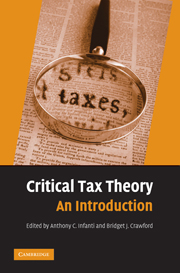Book contents
- Frontmatter
- Contents
- List of Illustrations
- List of Tables
- List of Contributors
- List of Common Abbreviations
- Introduction
- CHAPTER 1 FOUNDATIONS OF CRITICAL TAX THEORY
- CHAPTER 2 HISTORICAL PERSPECTIVES ON TAXATION
- CHAPTER 3 THE GOALS OF TAX POLICY
- CHAPTER 4 CRITICAL TAX THEORY MEETS PRACTICE
- A Legislator Named Sue: Re-Imagining the Income Tax
- Using the Social Background Model to Explain Who Wins Federal Appellate Tax Decisions: Do Less Traditional Judges Favor the Taxpayer?
- Tax Protest, “A Homosexual,” and Frivolity: A Deconstructionist Meditation
- Sisters in Law: Gender and the Interpretation of Tax Statutes
- Deconstructing the Duty to the Tax System: Unfettering Zealous Advocacy on Behalf of Lesbian and Gay Taxpayers
- CHAPTER 5 RACE AND TAXATION
- CHAPTER 6 GENDER AND TAXATION
- CHAPTER 7 SEXUAL ORIENTATION AND TAXATION
- CHAPTER 8 THE FAMILY AND TAXATION
- CHAPTER 9 CLASS AND TAXATION
- CHAPTER 10 DISABILITY AND TAXATION
- CHAPTER 11 GLOBAL CRITICAL PERSPECTIVES ON TAXATION
- CHAPTER 12 CRITICAL PERSPECTIVES ON CRITICAL TAX THEORY
- Index
Deconstructing the Duty to the Tax System: Unfettering Zealous Advocacy on Behalf of Lesbian and Gay Taxpayers
Published online by Cambridge University Press: 04 August 2010
- Frontmatter
- Contents
- List of Illustrations
- List of Tables
- List of Contributors
- List of Common Abbreviations
- Introduction
- CHAPTER 1 FOUNDATIONS OF CRITICAL TAX THEORY
- CHAPTER 2 HISTORICAL PERSPECTIVES ON TAXATION
- CHAPTER 3 THE GOALS OF TAX POLICY
- CHAPTER 4 CRITICAL TAX THEORY MEETS PRACTICE
- A Legislator Named Sue: Re-Imagining the Income Tax
- Using the Social Background Model to Explain Who Wins Federal Appellate Tax Decisions: Do Less Traditional Judges Favor the Taxpayer?
- Tax Protest, “A Homosexual,” and Frivolity: A Deconstructionist Meditation
- Sisters in Law: Gender and the Interpretation of Tax Statutes
- Deconstructing the Duty to the Tax System: Unfettering Zealous Advocacy on Behalf of Lesbian and Gay Taxpayers
- CHAPTER 5 RACE AND TAXATION
- CHAPTER 6 GENDER AND TAXATION
- CHAPTER 7 SEXUAL ORIENTATION AND TAXATION
- CHAPTER 8 THE FAMILY AND TAXATION
- CHAPTER 9 CLASS AND TAXATION
- CHAPTER 10 DISABILITY AND TAXATION
- CHAPTER 11 GLOBAL CRITICAL PERSPECTIVES ON TAXATION
- CHAPTER 12 CRITICAL PERSPECTIVES ON CRITICAL TAX THEORY
- Index
Summary
When we think about where a lawyer's loyalty lies, our thoughts most naturally turn to her client. However, a lawyer also sometimes owes a duty to others that trumps her duty to her client. For example, a lawyer is ethically prohibited from counseling her client to engage in criminal or fraudulent conduct. Moreover, a lawyer owes a duty of candor to a court, arbitrator, administrative agency, or any “other body acting in an adjudicative capacity,” even if the information that must be revealed is otherwise subject to the duty to maintain client confidences.
Likewise, it is generally acknowledged that a tax lawyer owes a similar special duty to the tax system that may conflict with and constrain the duty that she owes to her clients. There is some intuitive appeal to the notion that a tax lawyer must balance the duty to her client against a countervailing duty to the tax system. From the start, the taxpayer has a decided advantage over the government in tax matters merely by dint of the ability to self-assess her rightful share of the overall tax burden. Under our self-assessment system, the taxpayer has the advantage of: (1) being the only party with full knowledge of the relevant facts; (2) maintaining a great deal of control over whether – and, if so, how – those facts are shared with the government; and (3) knowing that the government lacks the resources to audit compliance with the tax laws in all but a small handful of cases.
- Type
- Chapter
- Information
- Critical Tax TheoryAn Introduction, pp. 100 - 106Publisher: Cambridge University PressPrint publication year: 2009



